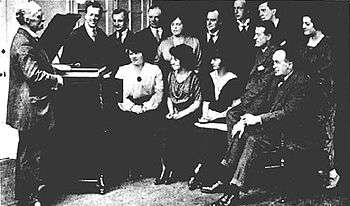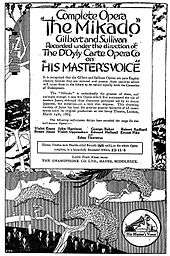Bessie Jones (Welsh singer)

Bessie Jones (1887 – November 1974) was a Welsh singer featured on some of the earliest recordings of songs from London musicals. Jones began a professional opera career soon after training at the Royal College of Music. From 1913 to 1926, she was a contract singer for HMV studios, recording numerous popular songs, Welsh folksongs and musical theatre songs, and appearing on recordings of the Gilbert and Sullivan operas and several other works. She also had an oratorio and concert career and sang in BBC radio broadcasts.
Early life and career
Jones was raised in Tonypandy the daughter of John Jones, a fruiterer.[1] Jones studied at the Royal College of Music, where she won the operatic class prize in 1910 and the Henry Leslie prize for singers in 1912.[2] In the college's 1911 production of Cherubini's opera The Water Carrier, Jones starred alongside George Baker under the direction of Richard Temple and Sir Charles Stanford.[3] She sang at the Proms in 1913 under Sir Henry Wood,[4] and played Wellgunde and the Woodbird in Wagner's Ring cycle at Covent Garden under Artur Nikisch in 1914.[5] The Manchester Guardian called her, "a new soprano with a sweet voice of considerable power."[6]
HMV and later years

Jones was a contract singer for HMV studios from 1913 to 1926 recording popular numbers as well as Welsh folksongs in the original Welsh.[7] Among her notable recordings was the original 1918 recording of the song "Peter Pan", Noël Coward's first lyric for the London stage, from the revue Tails Up!.[8] This was Coward's first publicly performed song.[9] She was one of HMV's contract singers to use the pseudonym "Madame Deering."[10]
When HMV's earliest recordings of the Gilbert and Sullivan operas were made between 1918 and 1924 under the direction of Rupert D'Oyly Carte, Jones sang the roles of Peep-Bo in The Mikado (1918), Gianetta and Fiametta in The Gondoliers (1919), Kate in The Yeomen of the Guard (1920), Edith in The Pirates of Penzance (1921), Lady Saphir in Patience (1922), Celia in Iolanthe (1923) and Josephine in H.M.S. Pinafore (1924).[11] Also for HMV, Jones recorded Edward German's Merrie England under the direction of the composer in 1918,[12] and Puccini's Madame Butterfly in 1924, in which she sang Kate Pinkerton.[13] For the same company Jones recorded less serious repertoire, including the songs "Down Zummerzet way" (by T C Sterndale Bennett), "The interfering parrot" (from The Geisha), "Up there!" (by Ivor Novello), "Daddy's sweetheart" (by Liza Lehmann), and "The Mirror Song" (by Oscar Straus).[14]
In the concert hall, Jones's repertoire included Berlioz' La damnation de Faust and Bach's St Matthew Passion.[15] She was a pioneer broadcaster, singing on BBC radio when the organisation was still a limited company.[16] In one performance from 1938 on a BBC radio programme in Wales, she was accompanied on the piano by her husband Edgar Jones.[17]
Notes
- ↑ "Flattering Reception of Miss Bessie Jones at Queens Hall London". The Rhondda Leader. William David Jones. 1913-08-30. Retrieved 2016-07-25.
- ↑ "The Royal College of Music", The Times, 25 Match 1910, p. 6; and "Royal College of Music Exhibitions", The Times, 1 April 1912, p. 12
- ↑ "Royal College of Music Operatic Performance", The Times, 22 November 1911. p. 10
- ↑ "The Promenade Concerts", The Times, 22 August 1913, p. 6
- ↑ "The Covent Garden Season – Das Rheingold", The Manchester Guardian, 22 April 1914, p. 5
- ↑ "The London Promenade Concerts", The Manchester Guardian, 22 August 1913, p. 9
- ↑ The Gramophone – Volume 54 – 1976, p. 755. Obituary: "Jones [at HMV] recorded [a song] from the fertile brain of Sir Noel Coward, then aged eighteen. Bessie Jones was also a member of the chorus behind many Hayes recordings by stars of the London musical theatre during the thirteen years".
- ↑ The Gramophone, Volume 56 (1979), p. 1486
- ↑ Levin, Milton. Noël Coward (1989), p. 14: "[Coward's] oldest surviving work is a song, "Forbidden Fruit," written in 1915 but not publicly performed, apparently, until 1924".
- ↑ Hillandale News – Volume 221, p. 226 (1998): "A prolific recording artist in the Edwardian period was the soprano Eleanor Jones, who began with Welsh songs ... the pseudonym "Madame Deering" was also used for some of the recordings of another Welsh soprano, Bessie Jones."
- ↑ Rollins and Witts, pp. x and xi
- ↑ "The Gramophone Co., Ltd", The Times, 25 September 1918. p. 10
- ↑ Gramophone Notes", The Times, 31 October 1924, p. 10
- ↑ Rust, pp. 67 and 79; "New Gramophone Records", The Times, 3 August 1922, p. 11; "The Gramophone Company Ltd", The Times, 5 December 1922, p. 9; and "Gramophone Records for April", The Times, 5 April 1923, p. 7
- ↑ "Langham Choral Society, The Times, 11 November 1920, p. 12; and "The Eisteddfod", The Times, 9 August 1928, p. 12
- ↑ "Broadcasting", The Times, 5 August 1926, p. 8
- ↑ "A vocal and pianoforte recital". BBC. Retrieved 25 July 2016.
References
- Rollins, Cyril; R. John Witts (1962). The D'Oyly Carte Opera Company in Gilbert and Sullivan Operas: A Record of Productions, 1875–1961. London: Michael Joseph. OCLC 504581419.
- Rust, Brian (ed.) (1975). Gramophone Records of the First World War – An HMV Catalogue 1914–18. Newton Abbot: David and Charles. ISBN 0715368427.